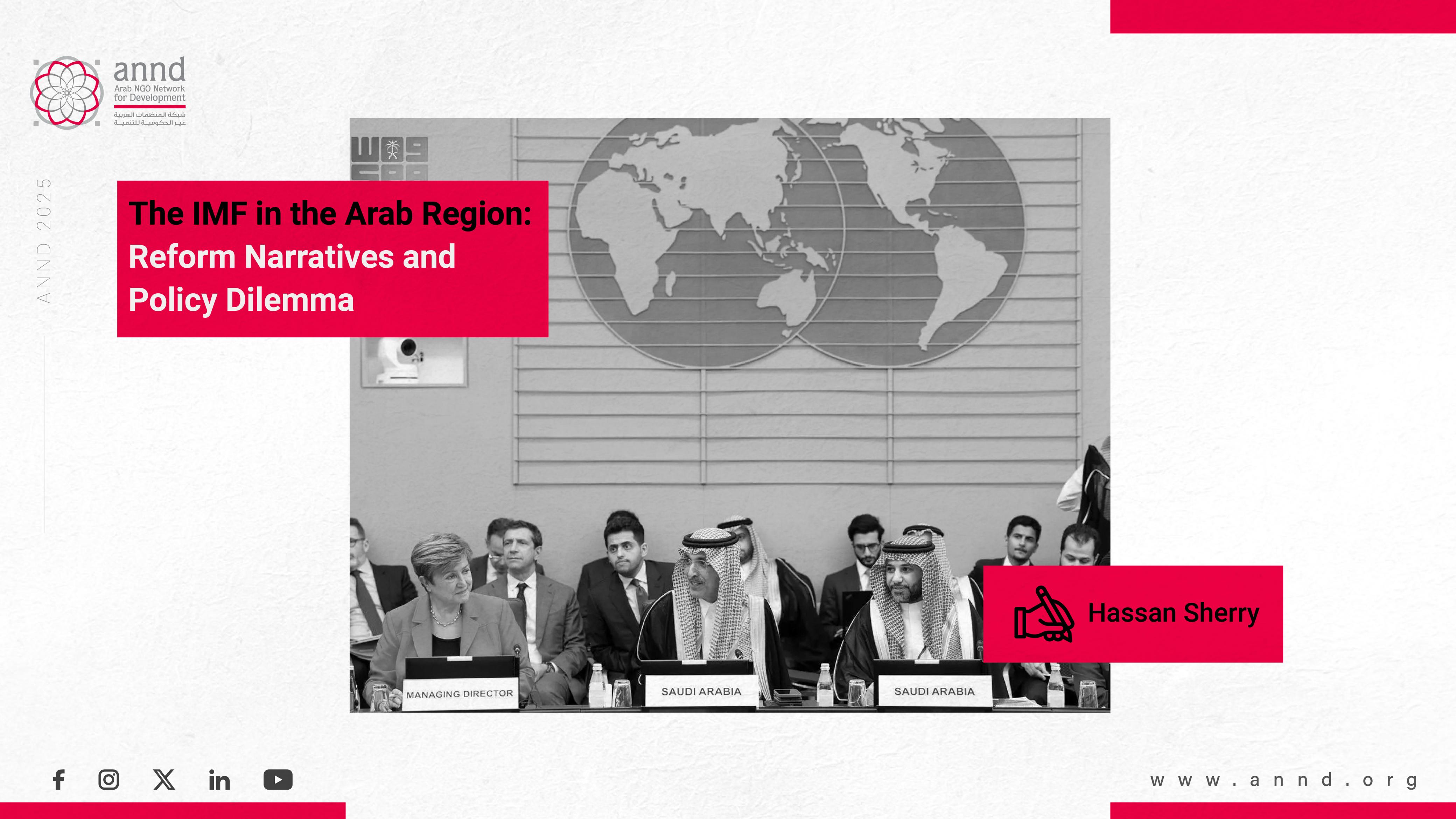
The IMF in the Arab Region: Reform Narratives and Policy Dilemmas - Hassan Sherry

The IMF in the Arab Region: Reform Narratives and Policy Dilemmas - Hassan Sherry
"There is no longer a distinction between economics and politics, because the same language prevails in both, from one extreme to the other..." — Jean Baudrillard - French philosopher and sociologist.
The International Monetary Fund (IMF) plays a pivotal role in engineering economic policies in the Arab region, particularly since the beginning of the last decade and the growing waves of popular movements. However, as economic and financial fluctuations and social crises caused by these transformations escalated, a critical perception of the IMF's role has taken root in the regional consciousness. This perception is based on two fundamental considerations. On the one hand, the IMF failed to effectively balance the requirements of financial stability and the imperatives of social justice, despite adopting a new discourse aimed at promoting inclusive growth and expanding the space available for national policies to confront development crises. On the other hand, lending criteria lacked consistency. Sometimes geopolitical considerations would prevail, leading to flexible conditions, while in other cases, strict austerity programs are imposed without sufficient regard for their social impact.
This problem—the gap between the IMF's rhetoric and its actual policies and the absence of consistency in lending criteria between countries in the region—was openly discussed during the IMF and World Bank Spring Meetings and the Civil Society Policy Forum (CSPF) in April 2025 in Washington, D.C., by various participating parties, particularly civil society organizations. During the sessions addressing the situation in Arab countries, Tunisia, Egypt, and Jordan were cited as prominent examples of these contradictions.
After years of cooperation with the IMF in Tunisia, the country expressed dissatisfaction with the imposed policies that contributed to exacerbating the social crisis. Consequently, it announced disengagement from the IMF and rejected its conditions for reducing subsidies and public spending. In contrast, the case of Egypt highlights how geopolitical considerations can overshadow economic criteria. Egypt received massive loans, including a $12 billion in 2016 and an additional $8 billion in late 2024, despite structural challenges and the continued deterioration of economic indicators. This treatment reflects the desire of international powers to maintain Egypt's stability as an important regional ally. In Jordan, the structural adjustment programs approved within the financing agreements included harsh austerity measures, including subsidy cuts and tax increases. Limited social protection measures could not contain their effects due to weak institutional capacity.
This article argues that this duality is a result of two main factors. First, the IMF's functions are a direct reflection of geopolitical shifts. Second, in the institutional dimension, the IMF is affected by various internal and external pressures that shape its orientations and policies.
Shifting Geopolitics and the Reshaping of the IMF's
Functions
It is evident that the IMF's functions reflect geopolitical shifts, particularly since the 1990s and the collapse of the Soviet Union. Back then, a Western approach emerged linking economic stability with promoting democracy. This trend was evident in the IMF's programs, which focused on good governance and transparency. The geopolitical dimension remained a decisive factor in guiding lending policies. In many cases, the IMF's conditions were relaxed to serve strategic interests, as in Egypt and Zaire (now the Democratic Republic of the Congo) during the Cold War. Support was driven by political pressure to ensure stability, while actual economic reforms were absent, according to Bordo and James (2000)1.
This pattern persists today, such as in Egypt after the 2023 Gaza War, where the IMF quickly expanded its lending program despite the country's chronic economic crises. The IMF continues to criticize corruption and undemocratic practices in small states, while remaining cautious with major powers, reinforcing the notion that geopolitics has become an integral part of its policies.
Another aspect reinforcing the IMF's policy link to geopolitical considerations is its cautious stance toward escalating trade wars and the return of protectionist policies, especially between major powers such as the United States and China. Although the IMF consistently promotes trade liberalization and market access as two fundamental pillars of economic growth, it avoids taking harsh positions or escalating when major powers with influence within the IMF adopt protectionist policies. In contrast, the Fund strictly imposes trade liberalization conditions on developing countries as part of its reform programs. Once again, this discrepancy highlights the double standard and confirms that the IMF's function is inseparable from the global geopolitical context.
Between Rhetoric and Practice: A Persistent Gap and Institutional Contradictions
Since the 2008 global financial crisis, the IMF has reviewed its policies. It emphasized the significance of countercyclical policies, such as expansionary spending and strengthening the state's role in economic stimulus and achieving social justice. However, practical experience in Arab countries has shown limited changes, as the IMF maintains its traditional approach. For example, Egypt, Tunisia, and Jordan were subjected to austerity measures that included raising energy prices and taxes, exacerbating poverty and unemployment rates.
Kentikelenis et al. (2016)2 explain this contradiction as resulting from a combination of maintaining the IMF's basic model and the "organized hypocrisy" that characterizes the work of international bureaucracies. The IMF, as a contemporary international organization, represents a space rich with contradictions, facing multiple pressures from shareholders and executive directors, internal bureaucratic and technocratic agendas, and public opinion. This interplay of external and internal pressures leads to a disconnect between the stated objectives in official rhetoric and actual practice. In response to these pressures, the IMF resorts to what is known as "systematic hypocrisy," which, according to the literature, is necessary to ensure the institution's continued functioning within the global financial system.
Concluding Remarks
Repeated experiences with the IMF demonstrate that the misalignment between rhetoric and practice and the problem of politicization of decisions have become structural issues rather than mere circumstantial exceptions. These practices confirm that international financial institutions, including the IMF and the World Bank, require radical reform to redefine their role within the global economic governance system.
Within the framework of the Financing for Development process, civil society organizations have called for the IMF and the World Bank to be re-subordinated to the United Nations. This umbrella would ensure that they adhere to the principles of transparency and democratic accountability, and that their policies are consistent with the Sustainable Development Goals (SDGs) and human rights, away from the geopolitical hegemony of a limited group of countries.
Addressing
these systemic issues is more urgent than ever to ensure a fair and balanced
global economic system that serves the interests of all peoples.
Recent publications

